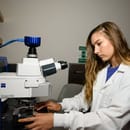We’ve all been there—you have two projects, three essays, an exam AND a speech all due in a week. How else are you going to finish all that work other than by pumping yourself full of caffeine in every way, shape and form? Coffee, tea, energy drinks, straight caffeine pills – it doesn’t matter. While all of those milligrams of energy will get you through your week from Hell, they’ll likely also give you a caffeine dependency that’ll be hard to kick for the next few weeks, if not months.
Caffeine is the most consumed drug in the world and is actually considered psychoactive due to the physical ways it impacts your brain. This means it falls into the same group as LSD, alcohol, and even cocaine. And you can develop an addiction to it just the same as any of these other drugs, in as little time as one to two weeks of continued use.
Say you decide to stop drinking coffee once your schedule calms down a bit. Then you start feeling pretty terrible, and you don’t know why. That headache, sleepiness, anxiety, insomnia, and even muscle pain and depression are probably all stemming from the same place—caffeine withdrawal. According to the American Psychiatric Association, caffeine withdrawal is actually classified as a mental disorder and has been since 2013.
These withdrawal symptoms come from your brain trying it’s very hardest to keep you in balance while suffering from an abrupt loss of the stimulants it got used to. The reason we like caffeine so much is that it blocks the receptors in our brain that make us feel tired, as well as making us produce adrenaline to energize us even more. But the brain doesn’t like to have its receptors blocked, so it decides to grow some more that you can’t block (this is why you start to need more and more caffeine to feel its effects!). This cycle continues for as long as you continue to pump caffeine into your system. Then you stop. And now the brain has all these tired receptors and nothing blocking them. So, you feel REALLY tired and gross. And you’re going to keep feeling like that for a while.
But here’s the good news: if you can get by without caffeine for 7-12 days, your brain will spontaneously get rid of those extra tired receptors, and you’ll go back to feeling like normal! Then you just have to try not to go through the cycle all over again the next time your schedule seems planned by the devil himself.
Speaking from personal experience, caffeine withdrawal sucks and I highly recommend never becoming as dependent on it as I was my freshman year. Turns out living directly above a Starbucks and having a best friend who can hook you up with discounted coffee isn’t the best way to avoid addiction. Having a regular order of a venti vanilla iced coffee with three shots of espresso doesn’t help either…. I do not recommend taking in 635 mg of caffeine at a time.
This isn’t to say that you shouldn’t have any caffeine ever. I’d be pretty hypocritical if I wrote that considering I needed a cup of coffee to be coherent enough to write this. Just try not to drink it every day. Let your brain rest and use its receptors as normal, and you should be good.



